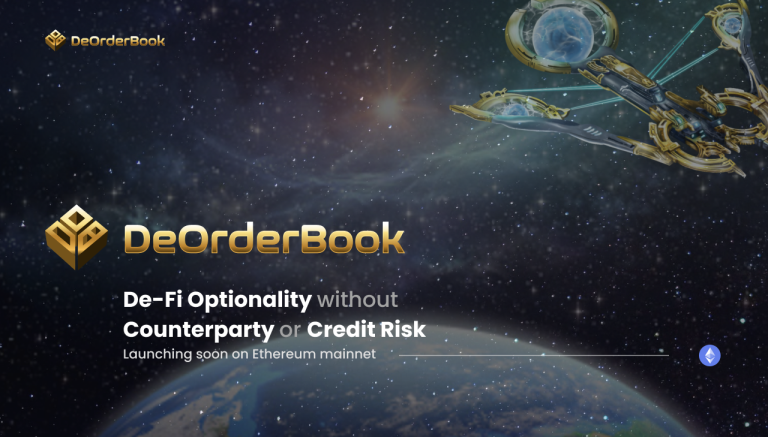
PRESS RELEASE. DeOrderBook, a groundbreaking decentralized finance (DeFi) optionality protocol, is gearing up for its Ethereum mainnet launch, ushering in a new era for DeFi users who seek unprecedented capital flexibility, advanced hedging mechanisms, and sustainable real yield.
At launch, the protocol supports $WBTC and $USDC although the team is actively working on support for further coins and chains.
What makes DeOrderBook especially interesting?
DeOrderBook’s unique design represents a significant departure from traditional DeFi protocols by providing an automated way to monetise an optionality position — think about it as a Uniswap for optionality. We created a coherent demand-and-supply system for the $DOB token to act as the magnet for optionality-writing liquidity while simultaneously providing a robust auction-like mechanism for the demand side that catches the whole range of optionality-rights generated by the protocol. Combined with fee-sharing, this gives DeOrderBook a significant advantage in mechanism design that is built around sound tokenomics.
Moreover, from a security perspective, DeOrderBook’s strategy is that the big movers in DeFi need a protocol where their risk can be completely bound. To deliver on that premise, we designed a protocol that is truly trustless (i.e. 100% DeFi) where not only we managed to eliminate all sorts of counterparty (including custodial risks) and credit risks but even removed oracles completely from the design by working through the fundamentals of options design and game theory.
The result is an optionality protocol that is unparalleled in its utility and security in either CeFi or DeFi. This innovative model guarantees a fair and transparent trading environment that eliminates “black box mechanisms” and other sources of catastrophic failures (e.g. oracle hacks, bad debt, or custodial malfeasance) that precipitated the bearish cycle we see in crypto today (i.e. preventable collapses of Terra, 3AC, and FTX).
How to participate
On DeOrderBook, the main user action is the placement of DeOrders, which work similarly to warrants in CeFi as a minimal-risk way to write upside or downside optionality. Once a user places their funds in a DeOrder, they instantly begin accruing rewards in $DOB, the platform’s native token. Even if a DeOrder doesn’t end up ‘in the money’, users are able to receive back the majority of their original collateral (plus their $DOB), less a 0.2% fee.
Join the Gerege NFT Program
DeOrderBook’s launch is also accompanied by its unique Gerege NFT program which is designed to further incentivize user engagement with the protocol. The NFT program was inspired by ancient passports granted by the Mongolian empire to facilitate free trade, and in the same vein this program allows users to access the maximal level of functionality offered by the protocol.
NFTs can be leveled up through active participation in the community, which in turn increases the percentage of fee-sharing that users can enjoy. In addition, users are incentivized to get in early with a unique system of pricing mechanics with a 25% increase every 500 mints, subject to change by the community. A 1 year guaranteed buyback scheme for the first 500 NFTs minted ensures that early adopters get a risk-free trial of the benefits of holding a Gerege NFT.
The first collection of Silver Gerege NFTs is already live on the Ethereum mainnet and currently on private mint. In order to whitelist all you have to do is register and validate your wallet. Users with mainnet balances of 0.005 $WBTC will be eligible for whitelisting.
DeOrderBook’s Mainnet Launch
By combining advanced tokenomics, oracle-free operations, and a user-centric approach, DeOrderBook’s imminent mainnet launch is set to disrupt the DeFi landscape, pushing the boundaries of what has been done before and empowering every user to make the most of their crypto holdings.
To learn more, follow DeOrderBook on Twitter or join the Discord to get the latest updates on the protocol. The protocol’s Youtube channel features deep dives and tutorials into the protocol, while its Mirror page regularly updates with new articles and community updates.
About DeOrderBook
DeOrderBook is a truly trustless optionality protocol that offers real yield, works without oracles, and solves capital inefficiency in both DeFi and TradFi optionality markets. Users may join its fee-sharing NFT program to further boost their rewards. DeOrderBook is launching eminently in the Ethereum mainnet with a Bitcoin optionality market.
Press Contact:
Renee
Product Marketing Manager
This is a press release. Readers should do their own due diligence before taking any actions related to the promoted company or any of its affiliates or services. Bitcoin.com is not responsible, directly or indirectly, for any damage or loss caused or alleged to be caused by or in connection with the use of or reliance on any content, goods or services mentioned in the press release.
from Bitcoin News https://ift.tt/4AgsN87
Comments
Post a Comment